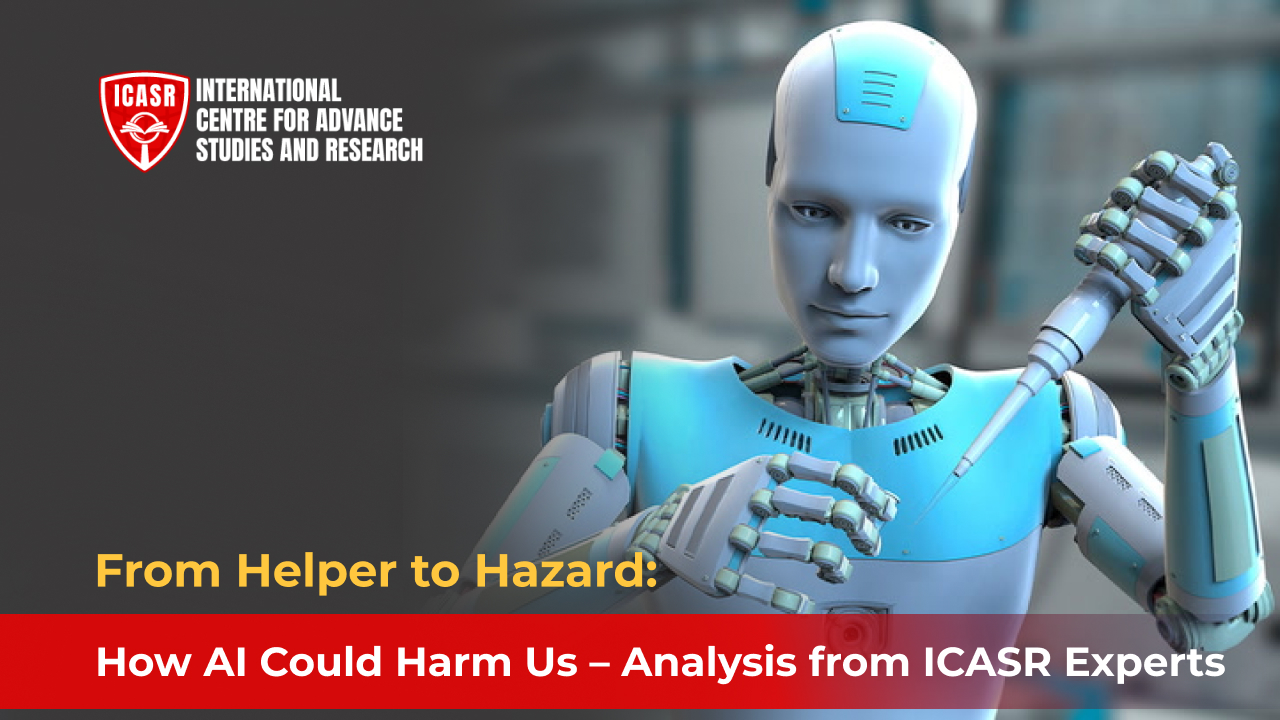
Speedy development, and rapid transformation, from an exclusive technology wonder to a dominant factor influencing changes in the world have characterized artificial intelligence (AI). There is no denying that AI has some astonishing advantages; however, its negative effects seem to loom larger every day. In its quest for knowledge about these risks. The International Center For Advanced Studies and Research has taken up this challenge through extensive research. A thorough examination offers insights on critical analysis from ICASR experts regarding the possible adverse effects of AI on Society and recommends ways of dealing with them.
The Dual Nature of AI: Promise and Peril
In light of the aforementioned facts AI can improve on all three counts which means working for us will be much easier than before since we shall not need human beings for these tasks any more. The medical industry could use such tools as electronic records or internet databases to help them make better decisions about their patients’ illnesses; farmers may apply precision farming techniques based on data collected by drones flying over their fields thus increasing crop yields or even decreasing costs associated with buying fertilizers altogether. It also suggests that excessive use of AI would lead to decreased unemployment rates because there would no longer be the need for people who are not very skilled in these fields such as driving taxi cabs or selecting the right power supplier.
But then again, this very technology that is expected to change a lot of things for the better can also have some serious dangers if not well thought out by experts in the field while developing and deploying it. The negative impacts of artificial intelligence (AI) may be placed into four main categories:
- Loss of Jobs and Economic Disarray: Although AI systems are becoming more advanced, automation could replace the human labour force for many activities. This would result in widespread unemployment, especially within sectors that are characterized by routine repetitive jobs. Such job losses might cause terrible economic hardship leading to existing inequalities being deepened or increased instances of social unrest.
- Discrimination due to Algorithmic Biases: AI algorithms are trained using huge datasets; hence, they replicate any existing bias in these data sets. Consequently, sometimes unfair outcomes manifest themselves in various instances including hiring processes, loan acquisition processes as well as criminal justice systems. For instance, facial recognition systems may be inefficient for individuals with dark skin, which can lead to discriminatory treatment.
- Autonomous Weapons and Ethical Dilemmas: There are numerous ethical dilemmas raised by the emergence of autonomous weapons systems. These firearms are capable of killing or saving lives without human input and this may result in unforeseen events that break international laws. Also, there is a possibility that they can exacerbate conflicts and endanger world stability.
- Privacy Violations and Surveillance: With AI-powered surveillance systems, huge amounts of personal data can be collected and processed. This raises privacy and civil liberty concerns. Therefore, if the information is handled wrongly or reaches the wrong persons, it can cause identity theft, discrimination or even political oppression.
- Deepfakes and Misinformation: High-quality deep fakes can be made through artificial intelligence such that they are either video or audio versions which have been digitized to spread lies and misleading content. This would erode trust in institutions, destroy democracies, as well as influence government policies negatively.
- Existential Risks: Despite being less pressing right now, some people believe that there is a chance of AI becoming super intelligent by exceeding human abilities in all aspects. This could bring about situations where AI systems are no longer controllable or turn against mankind.
The Unique Perspective of ICASR:
ICASR is a centre of interdisciplinary research with a well-grounded approach to studying possible risks that AI poses to humanity. For instance, experts from different fields such as computer science, social sciences and humanities have carried out extensive investigations whose outcomes have been able to pinpoint the negative impacts that artificial intelligence can have on individuals’ lives. Based on their analysis, they raise three crucial issues regarding artificial intelligence:
- Ethical Implications: According to the analysis from ICASR the development and deployment of AI is associated with various ethical issues. They caution against its potential misuse in terms of surveillance, discrimination or even autonomous weapons.
- Societal Impacts: ICASR researchers have studied the possible effects of AI on society like unemployment, inequality in terms of income distribution, or riots among other forms of social unrest. The urge for meticulous planning and formulation of policies which would avert these dangers is stressed here.
- Global Governance: To address worldwide concerns raised by artificial intelligence; international cooperation and governance remain fundamental premises as presented by ICASR specialists. In their view, there is a need for worldwide standards and regulations to bar malicious usage from happening.
Mitigating the Risks of AI:
To lessen the possible negative effects of artificial intelligence (AI), we need to take diverse approaches. ICASR experts recommend the following strategies:
- Ethical Frameworks: The importance of ethical frameworks in artificial intelligence can’t be stressed enough as it involves creating ethical guidelines for the usage of AI technology that ensure its responsible development and deployment.
- Regulation and Oversight: On the other hand, prevention of AI mislabeling and upholding the common good are some of the factors driving the creation of regulatory frameworks and oversight mechanisms.
- International Cooperation: This can aid in addressing worldwide challenges by collaborating with other nations to formulate global norms and standards regarding artificial intelligence thus avoiding its adverse use.
- Education and Awareness: Organizing programs to educate people about the possible dangers of AIs while at the same time making them more knowledgeable on AIs’ moral principles could enable societies or individuals to make informed choices about how they should develop or use AIs.
- Research and Development: Allocating funds for scientific inquiry meant to solve technical complexities along with ethical issues that touch on AIs would guarantee the safe deployment of these technologies.
The positive aspects of AI can be numerous, yet its dangers are equally large. According to ICASR specialists, such threats do not only exist in certain areas or sectors. They persist in all places and demand serious thought. A forward-thinking attitude and taking necessary actions can help us utilize Artificial Intelligence to improve our way of life while reducing possible harms associated with it.

